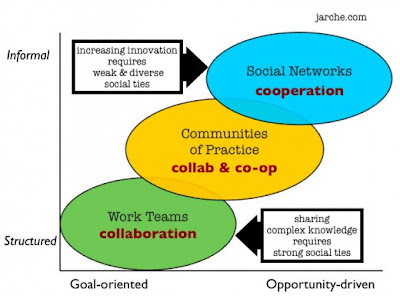Probably many of us still believe that expertise is something revolving around concrete knowledge that is linearly acquired with years on the job. Maybe something represented by a knowledge pyramid where learning is a step by step process that adds knowledge rungs to the expertise hierarchy.
I really like this quote by futurist Alvin Toffler, a notion which I think is a critical dimension of 'expertise' for today's knowledge worker:
"The illiterate of the 21st century will not be those who cannot read and write, but those who cannot learn, unlearn, and relearn."Is that more what expertise looks like today - an aptitude for iterative learning and agile relearning to meet emerging challenges? Taking a few familiar ingredients and combining something new, adding a catalyst to reformulate strategies and solutions - distilling something new, something fresh.
Occasionally it may even be necessary to explore revolutionary change that risks throwing out the baby with the bath water.
Previously I've discussed Personal Knowledge Management (PKM) and in particular highlighted a Seek - Sense - Share approach.
I think an individual's capacity for PKM really is the foundation of what we refer to as 'expertise'. Without PKM it's difficult to maintain currency of expertise.
Harold Jarche views the fast-paced dynamic environment that most of us now work within, as being characterised by perpetual beta. That is, the process of change tends to be the norm and we now operate within a state of flux where knowledge is continually shifting. The expertise to meet the challenge of perpetual beta largely depends on PKM and perhaps the notion of learn-unlearn-relearn.
Maybe the process of developing expertise these days is something like the journey to becoming a chess master. Sure, you need to learn the fundamentals - but over time you need to adapt quickly to changing circumstances and ultimately you need to become unpredictable to stay ahead of your competitors - you perhaps need to unlearn classic patterns and relearn strategies to create novel moves.
learn - unlearn - relearn.......................innovate





